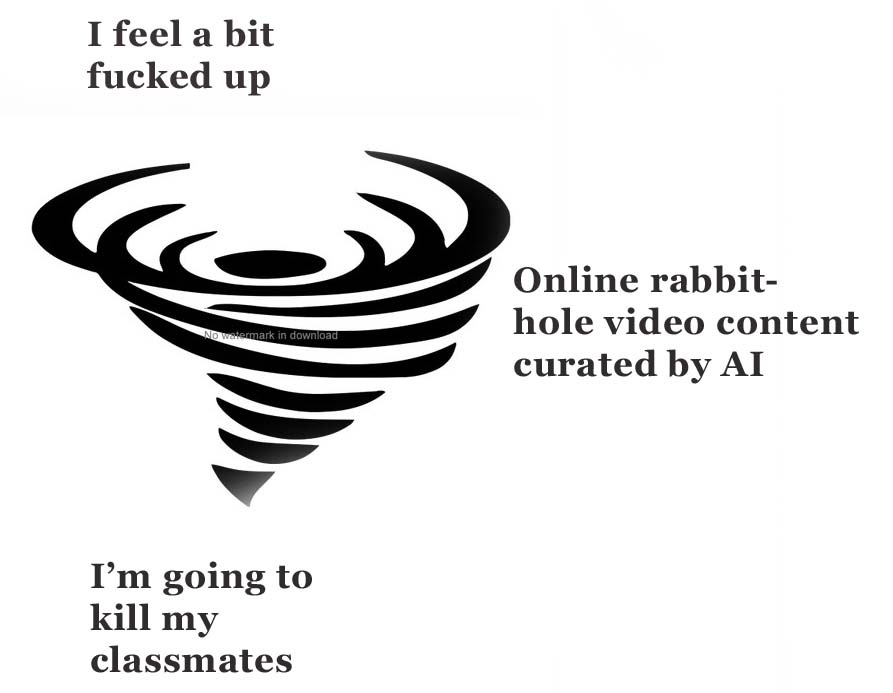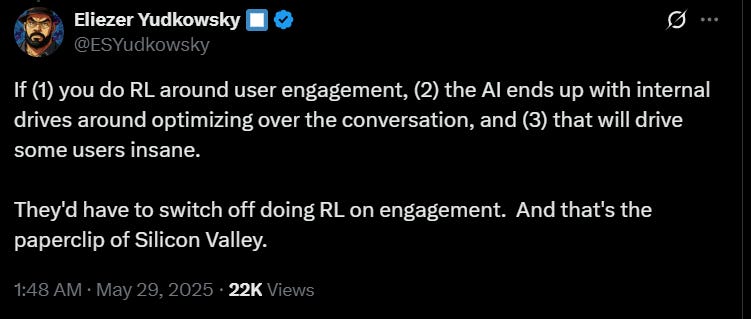At the end of 2024, I wrote a piece about how online rabbit-holes, created by social media AIs to maximise engagement, can lead to spontaneous radicalisation, particularly among the young. I used the example of Natalie “Samantha” Rupnow in the US.
Perhaps one might visually represent this process something like this:
A 15-year old encounters a “gateway” video on YouTube, watches it and then proceeds to watch increasingly extreme content selected by autoplay. Eight hours later she emerges from her room, grabs dad’s AR-15 and marches into high school to embark on a killing spree. Yes, there will usually be at least a few intermediate steps but I’ve kept things simple and hopefully you get the idea.
Keeping this model in mind, let’s consider things on a wider scale. Within about twelve months, the capacity for AI to capture the average citizen’s attention will likely considerably exceed that of the world around us - other people and things. AIs have been learning how to capture our attention since 2012 and, as I’m sure you’ve noticed, they’re getting better and better at it.
On our current trajectory, the machine hijacking of the majority of human attention seems inevitable, especially considering factors such as this, pointed out by an AI safety pioneer.
He’s saying that when LLMs use reinforcement learning (RL) to optimise engagement, any hard boundary between what is real or false will become progresssively diffuse as the AI focuses on holding your attention.
So the world of 2026 will find most people passing the majority of their time engaging with AI, rather than the physical world.
Now take a look at Google’s just-released Veo3 video content-creating software.
Click the image to see the thread and watch the AI generated videos that the software created from prompts. Can you tell them from real people? Me neither.
What we’re looking at by this time next year is a world roughly like this.
A world where each individual lives not only in their own little reality bubble, captivated by the images and stories that AI creates to captivate them, but one where it will become increasingly hard to know how real other people actually are anyway. In some ways, this has always been an aspect of the human condition. Philosophers call it the paradox of other minds. But our society and culture have thrived because our mammalian tendencies for social connection constantly rescue us from extreme introspections of this nature.
Now that certain deep philosophical crises within the core of our being are getting hugely amplified, I’m left wondering how many people will soon be capable of any level of social functioning anymore. Society itself survives only whilst a critical percentage of humans can function socially. And as AI gets progressively better at holding our attention, by 2027, we could easily see that threshold surpassed.
Of course, all this might be part of some cosmic plan. I wonder about this too. Is AI simply sucking consciousness out of the human body and up into an abstract realm for some spiritual purpose? Is this machine-assisted gnosticism? Or is modernity actually a filter, blocking the majority of human genetic traits from continuing by creating a world where all but the very fittest will live their lives in distraction?
Hopefully, we get to find out. Strap yourself in.







What do you mean by this question: Is this Gnostisism?
Do you mean The Evil Demiurge's fantasy and the Archons takeover?
Yes yes and yes . It is officially being like , the secretary that you thought was a really helpful part of your husbands business , but is actually secretly fucking him , and they are going on a vay cay to the Bahamas together , not the buisness trip that he told you he was going on .